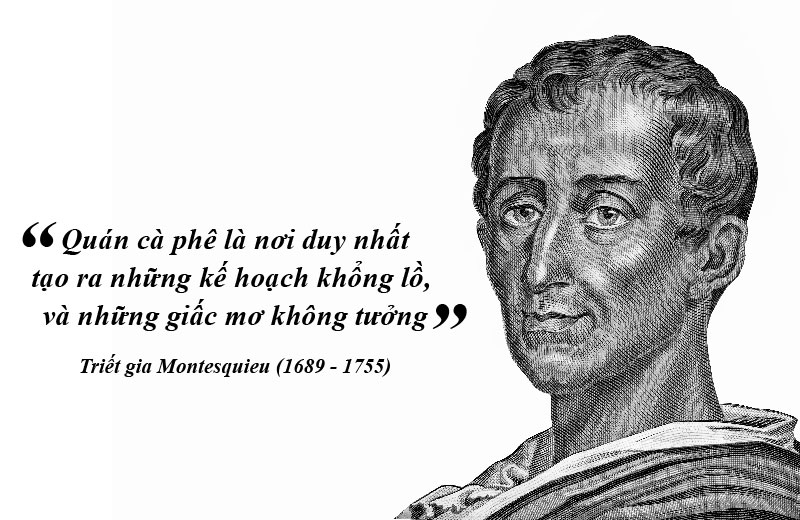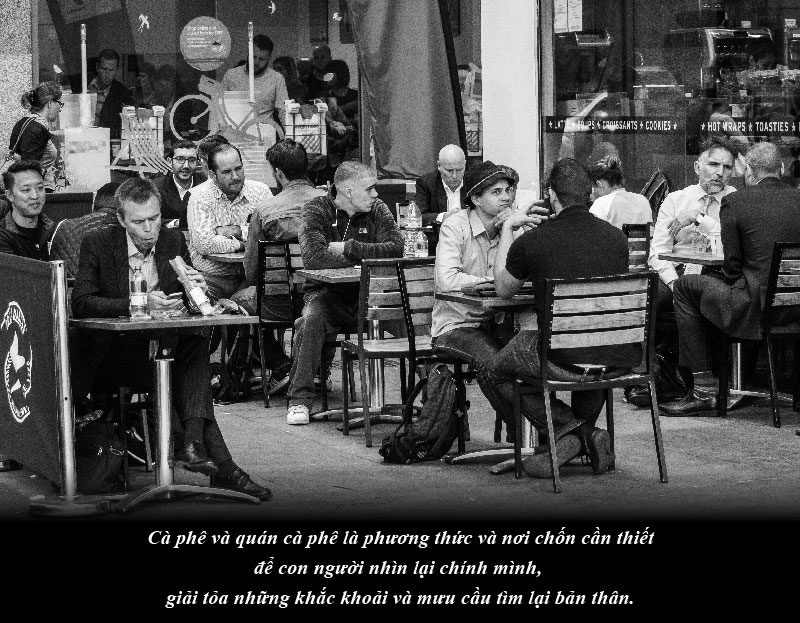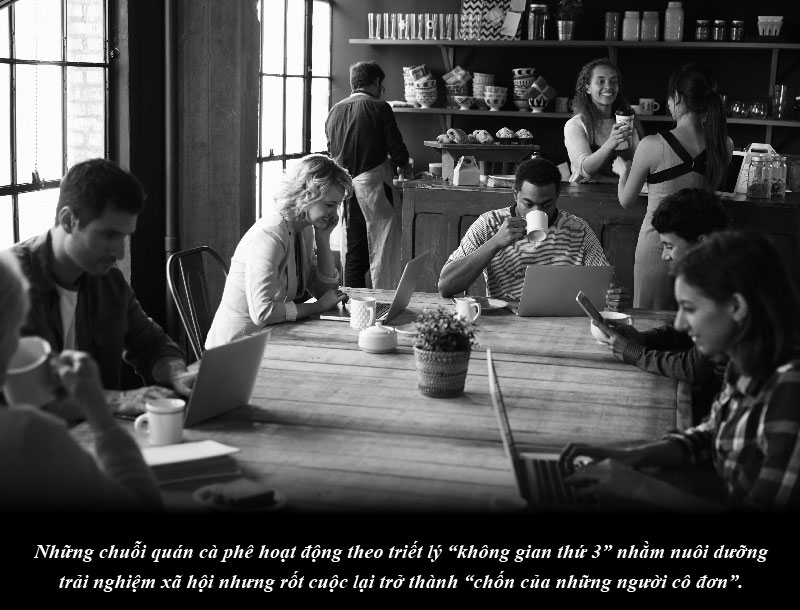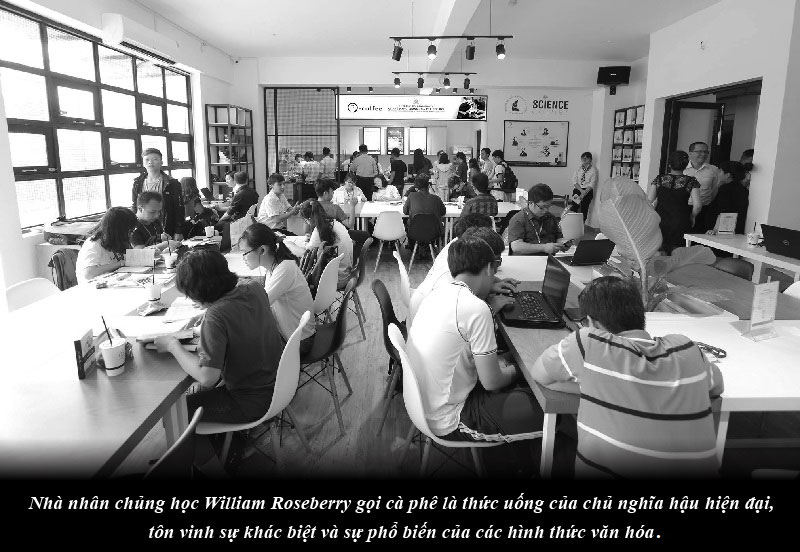Article 66: Finding ourselves through coffee
Coffee and coffee shops are a way and a place for people to find themselves. To be more specific, coffee is not only a way to understand the meaning of life but also to enhance life.

“The coffee shop is the only place where grand plans and utopian dreams are made.” Philosopher Montesquieu (1689–1755)
Going back to origin through coffee
People of the 20th century, especially after the 80s, were under heavy pressure from the “violence of time”. Originally, the pressure of increasing competition in life forced people to always surpass others and surpass themselves. At the same time, the economic crisis continuously led to the state of insecurity when falling into unemployment. The two extremes of “lack of time” to complete what needs to be done to affirm their position, and “excess time” for those who have been marginalized in life, creating the modern disease: stress and depression!

Coffee and coffee shops are a necessary way and place for people to look back at themselves, relieve anxiety and seek to find themselves.
Swinging between the two extremes turns into a dynamic that affects the social consciousness, how to define oneself in relation to the speed of life. Unidirectional time, every passing minute is an irreversible process. That unique flow is accelerating more and more with the popularity of man-made means to shorten and master time. Not only that, with the development of information technology, an unprecedented mixed reality and virtual world increasingly invades life. People have to play many roles about themselves not only in life but also in the space-time realm of social networks. In the end, people fall into confusion about being human.
The salvation of science, the good prospect of the world envisioned since the Enlightenment was thought to be an era of initiation that opened up human awakenings, unexpectedly once again fell into a stalemate. The rapid transition from modern society to postmodern society inevitably leads to a crisis of consciousness, the formation of a new consciousness, especially the rediscovery of the national and individual status amidst the anxiety of survival and the emergence of countless new thoughts and experiments in defense of personal liberation. Consumption and enjoyment of coffee is not only not excluded but also contributes to the reproduction or transformation of that trend.

The coffee shop chains operate under the philosophy of “third space” to nurture social experiences but end up becoming “a place for lonely people”.
It can be seen that, at the beginning of the 20th century, instant coffee was a mass product, exploding in the fast-paced, convenient modern world. Then, in the 1970s, enjoying coffee was seen as a social experience, along with the birth of coffee shop chains operating under the philosophy of “third space” between work and home. A place that offers space – time to rest in the hustle and bustle. From here, the concept of specialty coffee was born, and coffee, which was considered an essential commodity, simply began to be elevated to a luxury drink that some people did not have access to. Moreover, the word space means contemplating life, the development of internet-connected facilities disrupts community communication, making the cafe a “place of lonely people” to drown their sadness into a cup of coffee.
Coffee – a “subculture” with its own philosophy
Until the end of the 20th century and the beginning of the 21st century, along with the establishment of a new era consciousness was a change in thinking about coffee. Not the usual drink. Not an item for commercial competitive marketing. Coffee is recognized as a “subculture” with its own identity, original biography, discourse, and philosophy. From this stage, coffee production is viewed as a cultural and cognitive process, it is understood that coffee is not only produced physically but also culturally marked.

Anthropologist William Roseberry calls coffee a postmodernist beverage that celebrates the diversity and prevalence of cultural forms.
In addition to the identities, flavors, academic standards, etc. displayed on the packaging, coffee industry professionals position their brand as a style icon, a lifestyle statement or a social statement. For example, General Foods International Coffee (USA) described coffee as a luxury product for the rich and classy. Gloria Jean’s Coffees (Australia) established a perfect coffee culture experience ecosystem from coffee bean to cup according to the philosophy of “Good Cup” – making life better. The premium espresso brand illycaffé, based in Italy, declared its mission to improve the quality of life through the art of coffee. Meanwhile, the La Marzocco brand built the Accademia del Caffè Espresso academy system using coffee as a means of promoting consumer cultural innovation, making the planet a better place…
From the changes in coffee thinking, a new direction in coffee enjoyment was born. Some genres such as Espresso Mi Cultura in Spanish were affirming one’s own opinion, understood in the sense: enjoying coffee is affirming the cultural spirit, derived from self-reflection. Gourmet coffee is a coffee for connoisseurs to enjoy, knowledgeable about its genre, origin, roasting and special preparation. Hedonist coffee is more about the enjoyment of life, with the outstanding feature of exploiting the landscape to evoke the deep feelings of customers when drinking a cup of coffee. Café – cocktail specializing in mixing coffees with alcoholic beverages, combining “coffee wisdom” and “wine passion” to increase the excitement of the joy of life. Capsule coffee opens the way for customers to live a rich and high-class life.
In this sense, the basic concept of restructuring the way coffee is enjoyed is essentially restructuring life beliefs and self-image, which are facing so many crises. Coffee has become a symbol that arouses imagination, an essential value of identity at a historical time when people are seeking to relieve their anxiety and desire to find themselves again.
THE REAL COFFEE
ROASTED ONLY FOR PEOPLE OF WISDOM!
Source: “The Philosophical Way of Coffee” – copyright by Trung Nguyen Legend


